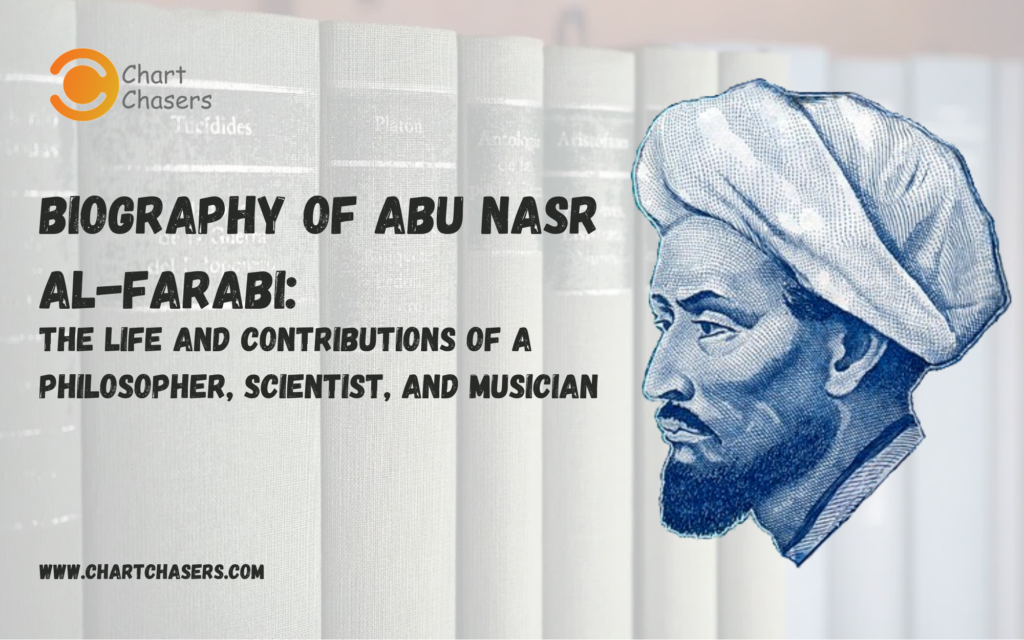
Abu Nasr Al-Farabi was a renowned philosopher, scientist, and musician who lived in the Islamic Golden Age. Born in Farab, a city in modern-day Kazakhstan, around 870 CE, he spent most of his life traveling through the Islamic world, studying and teaching philosophy, logic, music, and other sciences.
Al-Farabi’s contributions to philosophy and science were significant and long-lasting. He is best known for his works on metaphysics, ethics, political theory, and music theory. His influence on Islamic philosophy and culture, as well as on Western philosophy, was profound and enduring.
Early Life and Education
Abu Nasr Al-Farabi was born in Farab, a city located in the province of Khorasan, in what is now modern-day Kazakhstan. Farab was an important city in the Islamic world, situated on the Silk Road, a network of trade routes connecting the East and West.
Al-Farabi’s family was of Persian origin and belonged to the Sunni branch of Islam. He received his early education in Farab, where he studied Arabic, Persian, and Islamic theology. He showed an early aptitude for music and mathematics and later became known as a skilled musician and composer.
Al-Farabi’s intellectual curiosity and thirst for knowledge led him to travel extensively throughout the Islamic world. He studied philosophy, mathematics, medicine, and other sciences in Baghdad, which was then the center of Islamic learning. He also traveled to Damascus, Aleppo, and Egypt, where he studied with leading scholars of the time.
Contributions to Philosophy
Al-Farabi made significant contributions to several branches of philosophy, including metaphysics, ethics, political theory, and epistemology.
Metaphysics
Al-Farabi’s metaphysical works were heavily influenced by Aristotle and the neo-Platonic tradition. He believed that there was a hierarchy of beings, with God at the top, followed by the celestial beings, such as angels and planets, and then the sublunar beings, including humans, animals, and plants.
Al-Farabi’s concept of the “active intellect” was a central component of his metaphysical system. He believed that the active intellect was a separate entity that existed independently of the human mind and was responsible for illuminating human reason. He argued that the active intellect was necessary for humans to achieve true knowledge and understanding.
Ethics
Al-Farabi’s ethical works focused on the concept of happiness and the virtues necessary to achieve it. He believed that happiness was the ultimate goal of human life and that it could only be achieved through the cultivation of virtues, such as courage, justice, wisdom, and temperance.
According to Al-Farabi, the highest virtue was wisdom, which he defined as the knowledge of the ultimate causes and principles of things. He believed that the pursuit of wisdom was essential for the attainment of happiness and that it required a lifetime of study and contemplation.
Political Theory
Al-Farabi’s political theory was based on the idea of the ideal state, which he called the “virtuous city.” He believed that the virtuous city was one in which the rulers and citizens were virtuous and worked together to achieve the common good.
Al-Farabi’s concept of the virtuous city was heavily influenced by Plato’s Republic. Like Plato, he believed that the rulers of the virtuous city should be philosopher-kings, who were wise, just, and compassionate. He also believed that the citizens of the virtuous city should be educated in the virtues and in the skills necessary for civic life.
In conclusion, Abu Nasr Al-Farabi was a remarkable philosopher, scientist, and musician who made significant contributions to the fields of metaphysics, ethics, political theory, and music theory. His ideas and writings had a profound impact on Islamic philosophy and culture and were also influential in the development of Western philosophy.
Al-Farabi’s works on metaphysics and ethics, in particular, were groundbreaking and established him as one of the leading philosophers of his time. His concept of the active intellect, in particular, was a significant contribution to the development of Islamic philosophy.
In addition to his philosophical work, Al-Farabi was also an accomplished musician and composer. His works on music theory were influential in the development of Islamic music and helped to establish a tradition of music theory that would continue to flourish for centuries.
Overall, Al-Farabi’s contributions to philosophy and science were vast and enduring. His ideas continue to be studied and debated by scholars around the world, and his legacy remains an important part of the intellectual and cultural history of the Islamic world.








